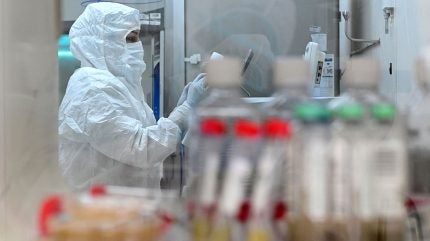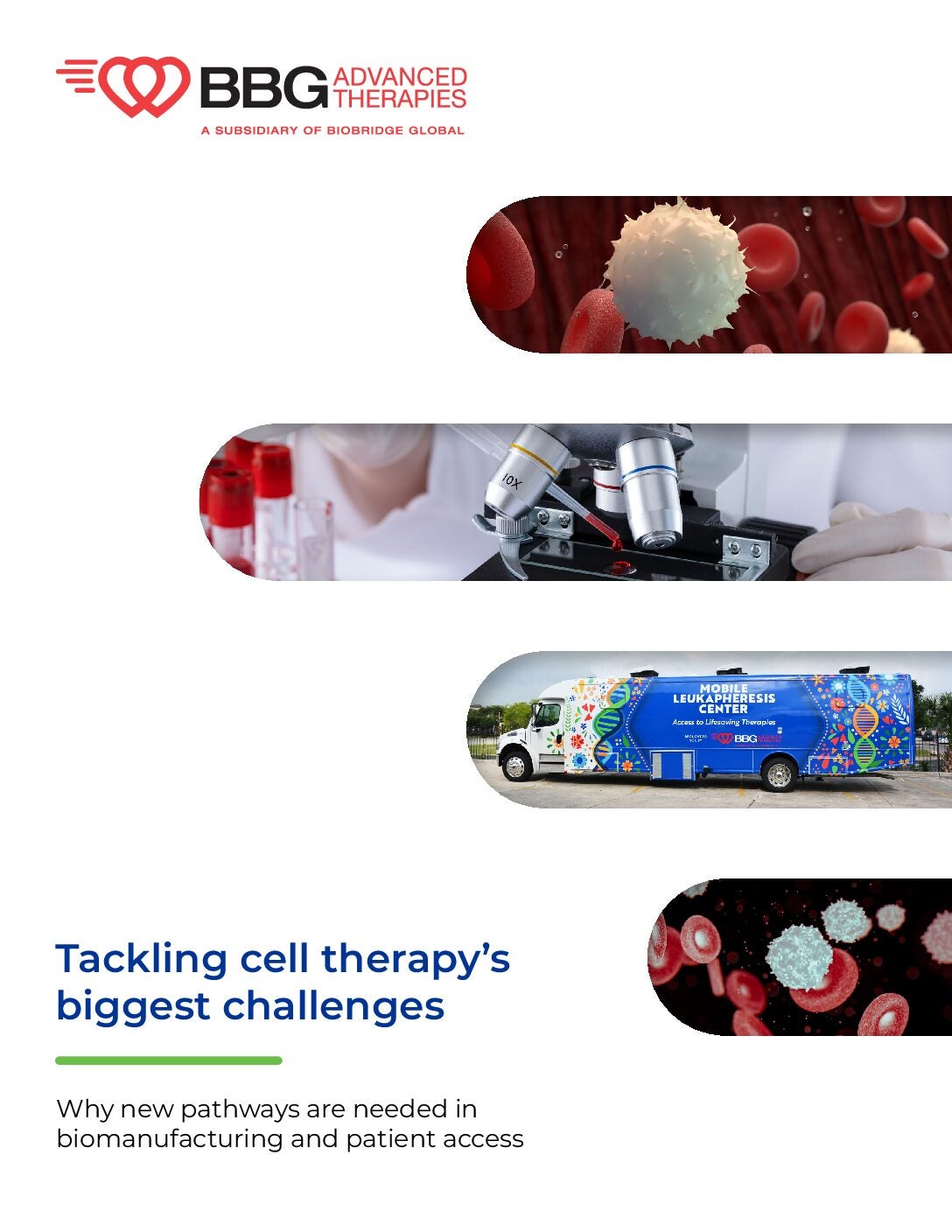
Dr. Zamilpa is the Executive Director of Biomanufacturing and Collaborative Programs at BBG Advanced Therapies, a subsidiary of BioBridge Global with extensive experience in stem cell research and manufacturing. Before joining BioBridge Global, Dr Zamilpa completed a post-doctoral training at UT Health San Antonio, during which he contributed to numerous publications on tissue repair and regeneration. Subsequently, he worked at a spin-off focused on developing manufacturing platforms for MSC expansion. He joined BBG Advanced Therapies’ biomanufacturing department in 2020 where he now supports industry partners with developing and manufacturing cell and tissue-derived products, which include MSCs.
“Mesenchymal stem cells (MSCs) were first discovered for their role in supporting haematopoiesis, the process of forming new blood cells,” says Dr. Zamilpa.
Possibilities to harness them quickly emerged within regenerative medicine; however, clinical translation had been delayed. Now, one year after the FDA’s landmark first approval of a mesenchymal stem cell therapy, the industry is poised to make a comeback.
What makes MSCs special?
“What makes [MSCs] special is that they can be found in almost every tissue in the body and are capable of differentiating into multiple lineages such as bone, cartilage, and adipose,” says Dr Zamilpa. “This gives them the potential to help regenerate damaged tissues.”
MSCs also have powerful anti-inflammatory and immune-modulating effects. This means that, in addition to replacing damaged cells, they release molecules that modulate inflammatory responses and promote tissue repair. As a result, they are being studied for a wide range of diseases, from arthritis and heart disease to autoimmune conditions and neurological disorders like Parkinson’s.
“Their potential is strongest in areas where inflammation plays a big role as well as repair and regeneration to restore function,” explains Dr Zamilpa.
Despite significant popularity in the mid to late 2000s, including 816 clinical trials for MSC therapies (27% Phase I, 31% Phase I/II, and 26% Phase II), until very recently no therapies had made it to market.
FDA approves first ever MSC product
December 2024 brought a watershed moment for the MSC community. That month, the FDA approved Ryoncil® (remestemcel-L), a mesenchymal stem cell therapy. Originally developed by Osiris Therapeutics and sold to Mesoblast for US$35 million following the completion of Phase III trials, Ryoncil is indicated for the treatment of steroid-refractory acute graft-versus-host disease (SR-aGVHD) in children.
SR-aGVHD is a severe complication of hematopoietic stem cell transplantation, affecting up to 50% of patients undergoing the procedure.[i] The prognosis for patients with SR-aGVHD is poor, with long term survival rates between 5–30%.[ii] Ryoncil works by slowing down the immune response, releasing anti-inflammatory factors that counteract the disease’s dangerous effects. Its approval validates the scientific consensus regarding MSCs’ potential, contributing to renewed activity in the field in 2025.
As of October, there have been 89 MSC trials commenced in 2025, up by 37% from full-year 2024 numbers. Meanwhile, financial signals are also up in 2025, with deal value from MSC-related equity offerings across the first three quarters of 2025 up 94% from the same period the previous year according to GlobalData’s Deals dashboard.
Key deals from the last few years include South Korea’s leading stem cell therapy company Cha Biotech raising $172.5 million in public shares in December 2024, closely followed by Australia-based Mesoblast raising $159.97 million to fund the US launch of Ryoncil as well as the acceleration of a second Phase III study in inflammatory chronic low back pain (CLBP).
Looking to the next potential wins, there are currently eight Phase III drugs being developed for approval in the US. These include Hope Biosciences’ HB-adMSCs for spinal cord injury and Corestemchemon’s Neuronata-R for amyotrophic lateral sclerosis. Mesoblast features heavily in the list, with remestemcel-L in development for Crohn’s Disease and GVHD and rexlemestrocel-L in development for various cardiovascular conditions and chronic low back pain.
The (bio)manufacturing process
As belief in MSCs is restored, researchers like those in Dr. Zamilpa’s team are now refining techniques to improve how MSC therapies are produced and used, making them safer, more effective, and easier to scale.
Step one in the manufacturing process is extraction, and the sources are numerous. BBG Advanced Therapies parent organisation operates a nonprofit community blood centre in San Antonio, Texas where a wide range of research-grade and cGMP starting materials are procured. For MSC therapies, those in highest demand are often adipose tissue (body fat), bone marrow, and human umbilical cord.
“Once we have the starting material, we generate MSCs by isolating the cells that naturally adhere to plastic surfaces in culture,” explains Dr. Zamilpa. “It’s a classic method that helps select for the stem cell population. These cells are then expanded to large quantities for therapeutic use.”
After manufacturing, MSCs can be delivered intravenously for systemic effects, or injected directly into targeted areas that need regeneration or healing.
Variability and scalability challenges
According to Dr. Zamilpa, these special cells come with some unique challenges. “Especially because we’re working with primary cells directly isolated from human tissue, which introduces a level of variability we can’t control,” he says, adding that some donors yield higher quality cells, or larger quantities, than others.
Variability has historically been one of the biggest challenges in MSC-based therapies, and it occurs not just from donor to donor but also across different manufacturing processes. Fortunately, according to Dr. Zamilpa, advances in automation and analytical development have helped to standardise how MSCs are produced and evaluated.
“We’re now seeing more robust release criteria and potency assays that ensure consistency and quality, which is a big step forward in making these therapies more reliable and scalable for clinical use,” he states.
The other major challenge is scale up, since MSCs have a limited number of passages before losing potency. “Scaling up production while maintaining quality is quite a delicate balance,” says Dr. Zamilpa.
Efforts to build a robust and reproducible manufacturing process at BBG Advanced Therapies have involved the creation of master and working cell banks. These have allowed the team to achieve more consistent yields, at scale, while preserving the potency of the cells.
Meanwhile, better handling techniques, including optimised cryopreservation and transport protocols, will help extend shelf life and simplify logistics for these therapies.
At BBG Advanced Therapies, the aim is to deliver a fully integrated and customisable portfolio of solutions to MSC therapy developers, from donor screening and starting material collection, through assay development, and cGMP manufacturing services.
The company’s biomanufacturing division, originally established as GenCure was launched in 2011 with support from the Medical Technology Enterprise Consortium (MTEC). The contract enabled strategic partnerships with leading organisations and thus laid the foundation for BBG Advanced Therapies cell therapy innovation. In 2020, MTEC awarded the organisation the Prototype of The Year award for their significant advancements in stem cell biomanufacturing, including the development of an MSC-specific, xeno-free bioreactor feed and the scale-up to a 50-litre xeno-free, batch-fed microcarrier expansion system for human bone marrow-derived MSCs.
Today, BBG Advanced Therapies operates a 6,700ft2 biomanufacturing facility in San Antonio, Texas, capable of supporting a wide range of production volumes including series runs using 250-litre bioreactors. Complementing this is a 2,600ft2 process development lab that provides a comprehensive range of analytical testing services, custom assay development, and advanced capabilities in cell isolation, and selection.
To learn more about cell therapies and one of the biggest challenges facing the industry, and how BBG Advanced Therapies is innovating to address this issue, please download the whitepaper below.
[i] https://www.pharmaceutical-technology.com/analyst-comment/ryoncil-first-fda-approved-msc-therapy/
[ii] https://www.nature.com/articles/s41409-024-02252-z



